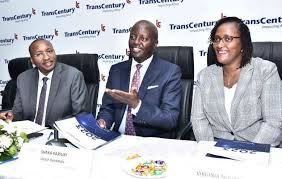TransCentury Plc, an infrastructure investment company based in Nairobi, Kenya, has returned to profit after facing financial challenges for several years. The company, which is listed on the Nairobi Securities Exchange (NSE), announced a net profit of $4.5 million (KES580 million) for the year ending December 2024. This is a big improvement from the $24.7 million (KES3.2 billion) loss it recorded in 2023.
Earlier in 2024, the company had shown signs of recovery when it posted a profit of $2.9 million (KES375 million) for the first half of the year, compared to a loss of $12.8 million (KES1.66 billion) during the same period in 2023. TransCentury said the return to profit was made possible by increasing revenue, cutting costs, expanding profit margins, managing currency risks better, and cleaning up its balance sheet.
The Group Chairman of TransCentury Plc, Mr. Shaka Kariuki, said the 2024 financial year was a major turning point for the company. He praised the management and the board for making bold decisions to bring the company back to life. Mr. Kariuki also thanked stakeholders for their support and patience during the company’s recovery journey. He said TransCentury is working on settling outstanding debts with its main lender in a peaceful way and is planning for long-term growth.
The company has a strong presence in East, Central, and Southern Africa. It operates in countries like Kenya, Uganda, Tanzania, Rwanda, South Africa, Zambia, and the Democratic Republic of Congo (DRC). It also distributes products in countries such as Mozambique. TransCentury invests in large projects in the energy, transport, water, agriculture, and industrial sectors, and has contributed to infrastructure development in many African countries.
Group CEO Mr. Ng’ang’a Njiinu said the 2024 results showed that the company’s strategy is working. He said the team managed to turn things around despite difficult business conditions in recent years. Mr. Njiinu described the profit as not just a financial win but also a show of the team’s resilience, strategy, and focus on sustainable growth. He added that the company will now build on this success to grow even bigger, fix its capital structure, and improve its balance sheet.
The company’s gross profit rose by 27%, supported by better product pricing, improved procurement, and efficient project delivery. TransCentury also said that strong financial discipline, good credit management, and smart currency moves helped to achieve the net profit.
TransCentury is still working on improving its balance sheet. The company said its improved income will help in the ongoing efforts to make its finances stronger in the coming months. One of the key developments is that its major shareholder, Kuramo Capital, has shown interest in writing off part of a $10.5 million (KES1.35 billion) loan to the company. This step is meant to reduce the company’s debt burden and help support its recovery and future plans.
TransCentury has been behind many major infrastructure projects in Africa. In the energy sector, the company has built power plants that produce more than 520 megawatts (MW) across Sub-Saharan Africa. Its subsidiary, East African Cables, produces electricity cables and transmission materials.
In transport, TransCentury has helped build roads in South Sudan, Kenya, and DRC. The company has also been involved in building industrial and manufacturing plants in Kenya, Uganda, and DRC. It has built storage terminals across Africa with a total capacity of over 236,000 cubic meters.
One of the notable projects completed by the company is the Security Screening Station at Jomo Kenyatta International Airport (JKIA) in Nairobi, which was handled by its former subsidiary Civicon. TransCentury has also provided engineering services for gold mines in DRC, showing its deep involvement in mining infrastructure.
Other subsidiaries of the group include Kewberg Cables & Braids, which focuses on cable manufacturing, Tanelec Limited, which works in power services, and Cableries Du Congo, another cable manufacturing firm based in DRC.
The company said its focus going forward is on growing organically, promoting innovation, and expanding its brands across Africa. Management plans to use market research and data to guide investment and create value for shareholders. TransCentury’s model is to find infrastructure gaps in the region and invest in projects that solve real problems while building scalable businesses.
The company’s comeback and steady recovery are coming at a time when demand for infrastructure is rising across Africa. By focusing on sustainable growth and leveraging its position in the infrastructure sector, TransCentury aims to become a strong force in regional development.
